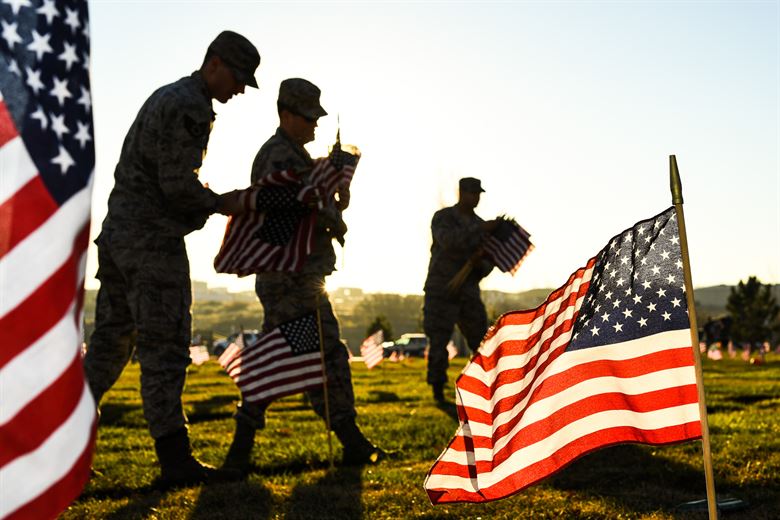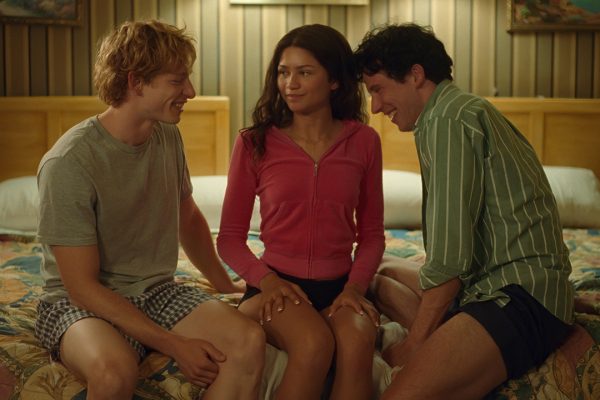OPINION: More help is needed for veterans suffering from mental illnesses
U.S. Air Force photo by R. Nial Bradshaw
Team Hill Airmen carry flag bundles during a flag-placing detail at the Utah Veterans Memorial Park.
November 11, 2018
In the wake of yet another mass shooting leaving 12 dead in Thousand Oaks, California, many are left trying to make sense of the senseless.
Two big questions can pop up after these tragedies: Was it an act of terrorism, and what was their motive?
Being a veteran myself, I can personally attest to the fact that I guarantee the shooter was suffering from a mental illness.
I lost two coworkers I served with by suicide, one of them after committing the same act of violence.
My heart goes out to the victims and their families. I am in no way condoning the actions of these shooters. What I am asking is that we, as a nation, do more for the mental health of our veterans.
We need to fight for them after they’ve fought for our country in order to prevent these tragedies from occurring. The shooter is often dehumanized for committing such an inhumane act, but they’re human too.
Everyone’s heart goes out to the victims and their families, but what about the shooter? Does anyone ever stop to think about what the shooter must have been going through mentally and emotionally? Or what kind of pain his family endured as they are left questioning why?
I may be playing devil’s advocate here, but after knowing and working side-by-side with a seemingly normal individual, only to find out he had committed the same type of senseless act, it changes you.
I went to his funeral, grieved with his family and then it struck me. Did the military and the VA do enough to protect this poor soldier from going off the deep end in the worst way possible?
Honestly, I don’t think they did. I sat through every briefing and slideshow made available to me and can attest that online prevention training is simply not enough. In order to prevent mass tragedies from occurring, one must be proactive. Why is it as a nation we choose to react instead of act?
Virtual online training is so impersonal. What we need are more people asking one another point blank if they are OK.
Active duty military are screened pre and post-deployment as well as prior to separating, but what about while serving? When I went through my first experience losing an airman by suicide, I remember being talked to as if it were protocol. It seemed so scripted.
While it was protocol, why did they choose to care after he committed suicide? Didn’t they realize if they had only been genuine from the beginning it may have prevented him from taking his own life?
When it had occurred for the second time within a year, the response was the same. Only this time they were mandating a majority of the squadron go see the mental health clinic, so they could check it off their checklist.
I felt compelled to be strong for my fellow airmen. For me, that was the only way to grieve, by trying to prevent another tragedy. Out of respect, I went to both funerals, the second being the hardest due to the circumstances.
I was friends with his fiance and I wanted to support her in the midst of all the negativity, frustration and anger for the lives he had taken along with his own.
Being at that funeral, I was able to look past the inhumane actions he had made by killing others before taking his own life, and see him as a human being. That was one of the hardest things I’ve ever had to do.
I was so angry at him for committing such a selfish, senseless act. His actions affected not only himself but everyone involved: From the innocent lives he took to his grieving family at the funeral.
But it was in that moment, seeing his aunt cry and questioning why his fiance did not do more, that it hit me. Why did the military not do more to protect their very own? They fight for our freedom, why shouldn’t we fight for their lives?




































































































































